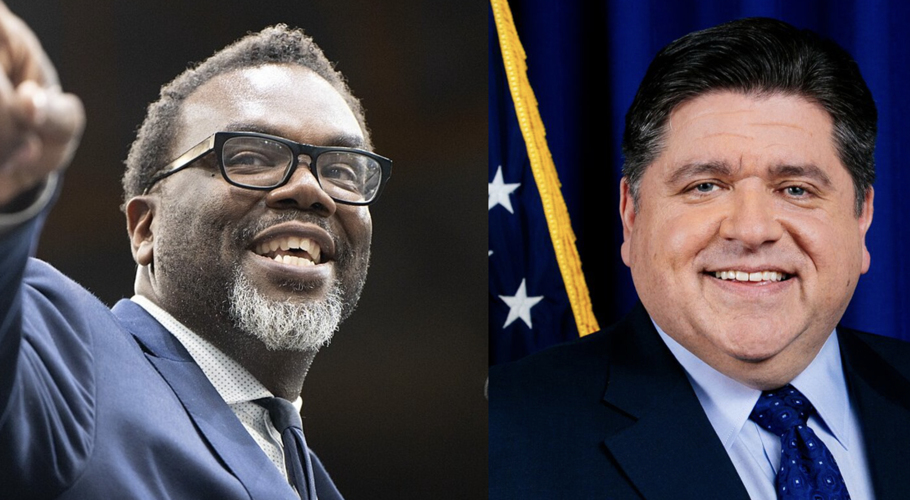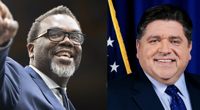
Chicago Mayor Brandon Johnson and Gov. J.B. Pritzker
WASHINGTON, D.C. - Illinois Attorney General Kwame Raoul has asked the U.S. Supreme Court to reject the sustained bid by President Donald Trump to deploy National Guard soldiers to support federal immigration enforcement operations in Chicago and its suburbs, arguing citizens can organize to oppose and fight against federal law enforcement - even violently - without fitting the definition of "rebellion."
At the same time, the Trump administration has urged the high court to step in and address what it has suggested is a coordinated campaign by activists and rioters, with public encouragement from Gov. JB Pritzker and now, federal judges, to actively block federal agents from enforcing the nation's immigration laws in Illinois.
In coming days, the Supreme Court is expected to weigh in on the court fight over whether President Trump has properly exercised his authority as the country's chief executive and Commander in Chief of the U.S. Armed Forces to federalize National Guard units from Illinois and other states and deploy those soldiers to provide security and operational support to Immigration and Customs Enforcement (ICE) officers working in and around Chicago.
Trump appealed to the Supreme Court on Oct. 17 after the U.S. Seventh Circuit Court of Appeals in Chicago backed up the ruling of U.S. District Judge April Perry.
Perry, an appointee of former President Joe Biden and a former top deputy of former Cook County State's Attorney Kim Foxx, had issued a temporary restraining order blocking Trump's orders. Perry had ruled Trump had exceeded his legal authority, as she believed the White House could not prove the Guard deployment was needed or lawful in this instance.
Perry specifically asserted she could not believe the federal government's assertions concerning the situation on the ground in Chicago and at the ICE processing facility in suburban Broadview. There, ICE agents have been the target of constant protests and, at times, violent actions by activists seeking to block ICE detention and deportation of illegal immigrants.
In arguments at the Seventh Circuit and Supreme Court, the White House has argued it is Perry who exceeded her authority, failing to give Trump's orders the constitutional and legal deference they deserve, if not actively interfering with Trump's constitutional authority as president.
"The district court’s injunction impermissibly substitutes the court’s own judgment for the President’s on military matters and rests on a construction ... that would render the statute a virtual nullity," wrote the White House, in a brief signed by U.S. Solicitor General D. John Sauer.
They said the ruling fits within a "disturbing pattern" of seeming coordination by illegal immigrants, their advocates and activists, and Democratic Party state governors and other officials, to use sympathetic judges to obstruct not only immigration enforcement operations, but the executive actions of the presidency, under Trump.
Sauer argued Perry had wrongly sided, almost completely, with arguments advanced by Raoul and others, who had all but claimed federal agents were overreacting to peaceful protestors.
The White House said the judge had brushed aside evidence that those protestors were actually anti-government agitators, encouraging and carrying out acts of violence and leveling threats of further escalation against federal agents tasked with carrying out federal law.
"The court acknowledged that violence against federal officers and property has occurred, but sought, indefensibly, to minimize it—refusing to credit sworn declarations from federal officials and instead accepting the implausibly rosy assessment of state and local officials," the White House wrote.
Further, the White House argued Perry engaged in still more legal chicanery, styling her order as a temporary restraining order, which she could extend, rather than an injunction, to attempt to block the president's policies and orders without appellate review.

Illinois Attorney General Kwame Raoul
In response to Trump's petition to the Supreme Court, Raoul, on behalf of the state of Illinois, and attorneys for the city of Chicago argued the White House's petition should be rejected.
The state and Chicago reiterated Perry's findings that Trump can't prove the Guard is needed or that the deployment is lawful, because they assert the organized and growing resistance, which has included incidents of violence and targeting of federal agents, can't be classified as a "rebellion."
Raoul and Chicago city attorney Mary B. Richardson-Lowry argued the president should be prevented from claiming there is a "rebellion" unless government agents are met with organized, armed resistance dedicated to overthrowing the U.S. government, as a whole.
So long as violent opposition is only against "a particular federal agency and the laws it is charged with enforcing," and not "a broader opposition to the authority of the federal government," the president can't support the legal authority he has claimed to federalize and deploy the Illinois National Guard or Guard units from other states over the objections of Gov. JB Pritzker.
In a response filed Oct. 21, the White House called the state's and city's arguments "outlandish," saying if that argument were sustained, it would unconstitutionally allow the courts to review and limit presidential military decisions.
They noted rulings from Perry and the Seventh Circuit fly against rulings on similar questions concerning the deployment of the Guard to support ICE operations in California and Oregon, where the Ninth Circuit Court of Appeals agreed Supreme Court precedent "bars a court from 'substitut[ing] its own assessment of the facts for the President’s assessment of the facts.'”
And in the Oct. 21 filing, the White House noted Illinois and Chicago have maintained their assertion that ICE needs no assistance, even while state and local officials themselves have actively opposed ICE operations and in many instances, sought to hinder federal agents from carrying out their duties.
“… State and local officials have not only failed to provide sufficient assistance to restrain and deter such violence, but fanned the flames of hostility by slandering DHS agents as rogue vigilantes and jackbooted thugs,” the White House noted in its brief.
The Supreme Court has not yet indicated when it may rule in the case.




